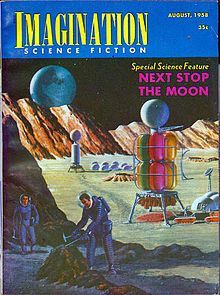The Long View Literature


I might almost have called this section "Just About Everything Else." Here is where I discuss a few of the novels, nonfiction, films, and other works that do not fall into any of the other categories. There is some literary criticism here. There is even some fiction by me. Deliberate fiction, I mean.
The latest addition is immediately below, on the left. The years are the years of the publication of the reviews, not necessarily of the books or other works being reviewed.
2008
The Brothers Karamazov (Yes, by that Fyodor Mikhailovich Dostoevsky.)
2007
Flicker: A Novel
(Here is an old review of Theodore Roszak's novel exposing the link between horror movies, Catharism, and film criticism. It's hilarious. On purpose.)
Endless Things
(The eschaton of John Crowley's Aegypt series.)
2006
Empire
(Orson Scott Card describes the beginning of the end of the American Republic.)
World War Z
(The history of the zombie menace, by Max Brooks.)
The Gray Havens
(This is my own fan fiction, inspired by J.R.R. Tolkien's The Lord of the Rings.)
2005
Christ the Lord: Out of Egypt
(Anne Rice's biography of Jesus the Child, from the point of view of the Subject.)
Lord Byron's Novel
(No, it's not Lord Byron's novel; it's John Crowley's.)
Saturday: A Novel
(Ian McEwan's account of how a neurosurgeon meets History on the day of the largest protest demonstration in British history.)
2004
The Holy Grail: Imagination and Belief
(Richard Barber's essential survey of the origins and history of the Grail stories.)
The Plot Against America
(Philip Roth's apocalyptic account of a counterfactual Lindbergh Administration.)
Anatomy of Criticism
(Northrop Frye explains absolutely everything.]
2003
Many Dimensions
(In this early novel by Charles Williams, we see the perils of marketing the Philosopher's Stone.)
The Flame Is Green
(R. A. Lafferty explains the revolutionary tradition.)
Little, Big
(John Crowley's novel of the subversive pixies of New York State.)
The Return of the King
(Film Review) (The road goes ever on and on, up to a point. My review of The Two Towers, by the way, is here.)
2002
After the Eighth Day
(Another story in the "Spengler's Future" scenario, set 170 years before "Ecumenical Twilight.")
Novelty
(A review of some of John Crowley's shorter fiction.)
The Translator
(More from John Crowley, this time about the role of pesky angels in the Cuban Missile Crisis.)
The Hour of the Laity: A Tale of Renewal for Halloween (This short story should not be confused with Mary Ann Glendon's essay in the November issue of First Things.)
The Glass Bead Game
(Hermann Hesse's novel about the future perfection of the West.)
2001
The Telling
(A review of Ursula K. Le Guin's zen-burger novella.)
[This is a missing page, I can’t find it in either the Internet Archive or my crawl of John’s site, so for now I’m marking it as lost to time. –BE]
Daemonomania
(John Crowely continues his exploration of the hermetic twilight in this third novel of the "Aegypt" series.)
Up in the Air
(Walter Kirn's novelistic adventures in Air World.)
The Fellowship of the Ring
(Peter Jackson's film, fair and square with no contradictions.)
1999
A Man in Full
(Tom Wolfe's meditation on the effect of testosterone on commercial real estate prices in Greater Atlanta.)
Incubus
(Ann Arensberg's novel about a demoniacal infestation of a town in Maine. Stephen King has serious competition.)
Fredy Neptune: A Novel in Verse
(Les Murray's blank-verse novel is a theodicy for the first half of the 20th century. It's wonderful.)
Ecumenical Twilight
(This is not a review, but an original horror story. Vampires! Oswald Spengler! Spelling Reform! Watch out.)
1998
Freedom & Necessity
(This is a 600-page novel that seeks to illustrate the principles of Hegel's "Science of Logic." Like Wagner's music, it is better than it sounds.)
Rainbow Six
(This surprisingly apocalyptic novel by Tom Clancy describes an attempt by deep ecologists to exterminate most of the human race in the year 2000.)
Forever Peace
(Joe Haldeman tries to end war forever in this novel. It does not quite work. Ah, well.)
1997
The Seafort Saga
(David Feintuch here gives us five old-fashioned science fiction adventures. I include them because of the rather Victorian future he depicts. That, and the fact I like science fiction.)
Executive Orders
(Tom Clancy's thought experiment about what we really need in a president.)
Tramp Royale
(If you like Robert Heinlein, you will like this travelogue of his trip around the southern hemisphere in 1953-54.)
1996
The Cunning Man
(This was Robertson Davies' last book. While he lived, he was by far my favorite living fiction writer. As far as I know, he did not know he was going to die. Nevertheless, this book reads a great deal like Prospero taking a final bow.)
The Island of the Day Before
(Umberto Eco uses the centuries-long search for a way to determine longitude as a metaphor for the arbitrary nature of knowledge. Or something.)